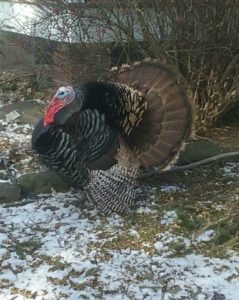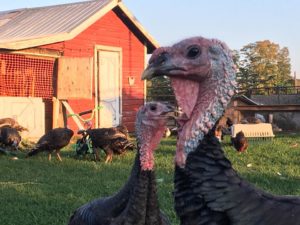
A perfect shot submitted by Julie Klouda Bontrager
So, you’ve been raising chickens for a few years and now you think it’s time to try your hand at turkeys? Like chickens, turkeys come in heritage, production, and ornamental breeds. There are many great choices to be made in all categories. The choice comes down to your needs and wants in a turkey. Do you love the tasty white meat or are you more inclined to choose the juicy dark meat? Do you want to be able to raise and hatch your own turkeys? So many questions, I will try to help you make the right choice for your needs.
Production Breeds
If you are looking to raise turkeys that are much like the Cornish X chicken breed, you should look at Broad-Breasted Whites. They are ideal for mass production and those looking for a good quantity of meat per bird. The Broad-Breasted Whites are your typical grocery store bird, they contain large breasts for the white meat lover. However, like the Cornish X, they don’t walk well, can’t fly, and are prone to illness. They do require less time than heritage breeds to get to ideal butcher weight. The Standard Bronze is another excellent choice for a meat producing bird. Considered the “American” turkey, this perfect cross between European and American breeds is loved by many backyard breeders.
Heritage Breeds
Some of the most well-known heritage breeds are Bourbon Red, Narragansett, and Blue Slate. Bourbon Reds are known for having fuller flavor meat and gorgeous red feathers. The toms average out at 20lbs and the hens 12lbs. The Narragansett breed is an absolutely beautiful grey feathered bird. Topping out around 30lbs for toms and 18lbs for hens, they are one of the larger heritage breeds available. Blue Slate turkeys can breed naturally and go broody, which is amazing! What’s not to love? Less white meat will be found on these breeds.

Gorgeous photo submitted by Allison Sarjeant
Fun Breeds
Midget White, White Holland, and Royal Palms are a few other neat breeds. Midget Whites are a cross between Royal Palms and Broad-Breasted Whites. The cross, therefore, produces a smaller bird, toms about 18lbs and hens around 10lbs. The richer flavored meat produced by this breed makes up for the smaller size. So, you want a broody breed? If you want to raise your own babies without an incubator, the White Holland is an excellent choice. They are a larger breed, toms weighing in around 30lbs and hens 20lbs. The Royal Palm breed is a bit more ornamental. They are smaller than most turkey breeds coming in at a mere 10-16lbs. These little turkeys can really fly due to their small size. Mainly grown for their flamboyant feathers, which are used in home decor, jewelry, crafts, and ceremonial purposes.
Requirements
Turkeys require a lot of the same equipment and housing as chickens, however, on a larger scale. First and foremost, turkeys need a secure home, they are susceptible to various predator attacks. They need roost bars, dust bathing areas, hanging drinkers, and enclosed feeders. Feed containing 24.5% protein or higher is required for healthy happy birds. Want to give them a high protein treat? Wet cat food or cooked egg yolks are a perfect choice. If breeding is in your future you will need at least one tom turkey. Each tom needs his own ten girls to satisfy.
Diseases
The number one disease you hear about concerning turkeys is Histomonaiasis, aka Blackhead disease. Unlike chickens, turkeys have no immunity to the disease. This is why many are against keeping turkeys and chickens together. There is no cure or prevention for this terrible disease. At one point an additive, Amprolium, was added to turkey feed, which fought against the disease, but the FDA pulled its approval in 2015. The symptoms of the disease are as followed: depression, huddling, foamy pale-yellow diarrhea, loss of appetite, excessive thirst, droopy wings, wattle, and comb become bluish-black in color, stunted growth, and death within a few days of noticeable onset. Want to read more about the disease? Check out this article by Kansas State University
Did you know that most commercially raised tom turkeys become lunch meat or ground turkey, while the whole table turkey is normally female? Turkeys can be extremely affectionate with their humans, following them around for much-needed attention. Whether you’re looking for a pet or dinner, there’s bound to be the perfect breed for your needs. As much as they are similar to chickens, they are undoubtedly just as different. Prepare and research before adding any new species to your farm or homestead.
Follow Carrie on Facebook, Miller Micro Farm, Community Chickens, and Mother Earth News













1 Comment
We are a commercial black soldier fly manufacturer and are currently selling our products live and dried worms for chickens, turkeys, swine, fish and many other animals. Can we connect? Let’s talk about drop ship possibilities.